Why do the true drivers behind Millennials’ behavior continue to elude marketers? It’s notoriously challenging in consumer insights research to accurately reveal the WHYs. We recently decided to take a closer look, but through an entirely new lens…
Written by Hunter Thurman and T. Sigi Hale, PhD.

BeSci, forged in the labs, hallways, and corridors of academia, reveals lots about nature, and but an individual’s nature alone can only tell us half the story. And examining the context in which an individual operates utterly disregards the individuality the consumer brings to the table. Instead, we must consider the whole ‘behavior equation’ in order to understand or predict behavior:

A person’s instinctive NATURE is the most stable part of the equation, and reflects her Habit of Control (more on that in a moment). The CONTEXT, or circumstances a person experiences (like a category or shopping engagement) impacts how that individual’s nature is expressed. Add these 2 variables together, and you get BEHAVIOR – both present and future.
The underlying key to this equation is CONTROL, which is a human’s most fundamental need and that which drives all behavior. That’s right—all roots of human behavior stem from the need for a sense of control. And it’s also WHY we buy the things we buy—to maintain, or recapture control over some facet of our lives. In buying personal care products, we are attempting to control our standing within our social tribe. And in buying food and beverage products, we are attempting to control how we feel. And so on…
An individual adopts one of four ‘Habits of Control’ at a young age in order to maintain, and when needed, regain control of the world around her. She then learns to navigate her world via her particular dominant Habit of Control…
Allow me to introduce you to the 4 ‘Habits of Control’:
Expert: Control via individual skill and tangible, rational knowledge
Alpha: Control via dominance over obstacles and challenges
Triber: Control via social belonging
Diver: Control via deep emotional connection
While humans primarily rely of a single Habit of Control, we still utilize all of them – depending on the context. For example, we all express the ‘Expert’ Habit of Control when taking a math test, but an individual who relies on Expert as his primary Habit of Control will be goal-oriented, and a potential over-achiever. Similarly, we all experience the ‘Diver’ Habit of Control when we pay close attention to a new food – we really notice the color, the texture, the smell, and then the taste. However, one who relies primarily on Diver may live his life in that space of hyper // sensory-immersive experiences.
Consider for a moment the context of Millennials’ upbringing during the rough economic and politically unstable times. As children or young adults, they experienced the terror of 9/11 and the war in Iraq, the 2008 economic collapse due to the real estate boom & bust, outrageous college tuition increases, and the escalating cost of medical insurance. Put simply, Millennials are a generation in survival mode.
Our BeSci Survey revealed some interesting – and surprising – Millennial truths.
Millennials, Gen Xers, and Boomers completed a battery of behavioral science-based questions, answering strategic, scientific and sometimes out-of-the-ordinary questions that are designed to uncover behaviors and motivations that reveal far more than what mere observation can tell us.
For example, one such question posed:
If I went to an art museum,
a) I’d want to learn about the art.
b) I’d probably be critical of what I saw.
c) I’d want to see famous or well-known works of art.
d) I’d look at the art very deeply.
Data patterning and statistical analysis of the neuroscience-based outcomes reveal the Millennial generation’s NATURE, or Habit of Control.
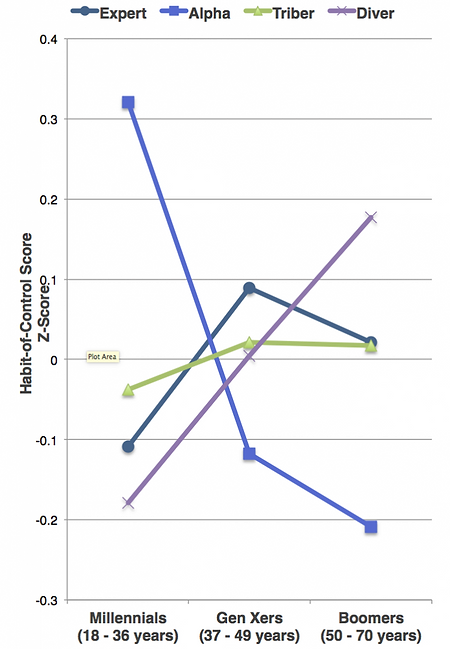
Millennials demonstrate a drastically higher Alpha score (control via dominance), which is the Habit of Control triggered when threatened. Inversely, they demonstrate a markedly lower Diver score (control via deep connection), which is the Habit of Control enabled when feeling relaxed and secure. This further demonstrates that Millennials are a generation in chronic “fight or flight.”
Notice the markedly high Diver score and low Alpha score for Boomers? Think back to their world growing up: It was the end of WWII, and the world had become a safer place. Throughout their childhood, they experienced prosperity via the post-war economic boom. It makes sense that Boomers adopted the Habit of Control that is enabled when relaxed and secure, and relied the least amount on Alpha, which is enabled by fight or flight.
So all Millennials are the same, right?
Well, not exactly.
Although they are a unique generation, marketing to Millennials as a homogeneous group would be a huge mistake. Not only are generational differences distinct, but gender differences for Millennials are also unique.
In a nutshell, Millennial Men stand alone.
Evolutionary psychology tells us that survival pressures drive men to control via dominance. Millennial men skyrocket on Alpha—far more than Millennial women, and far more than GenXers and Boomers. This means that they utilize the other habits of control drastically less, leading to the stereotypical ‘Alpha Male’ behavior.
What does this mean for marketers?
The good news is knowing that Millennial men are ‘Alpha Male’ consumers tells us 3 things:
Millennial men seek to convey social status in order to gain a sense of superiority.
Their gut reaction to a product plays a significant role when making a purchase decision.
They discover new products in-store using visual, not verbal clues.
Millennial men are less likely to pre-plan a shopping trip and the items they plan to buy. While shopping, they are more likely than women or men of other generations to notice new products while shopping, and therefore are much more easily captured in the store, and in the moment.
They also demonstrate a markedly dominant instinctual decision-making style, indicating that they are impulsive buyers.
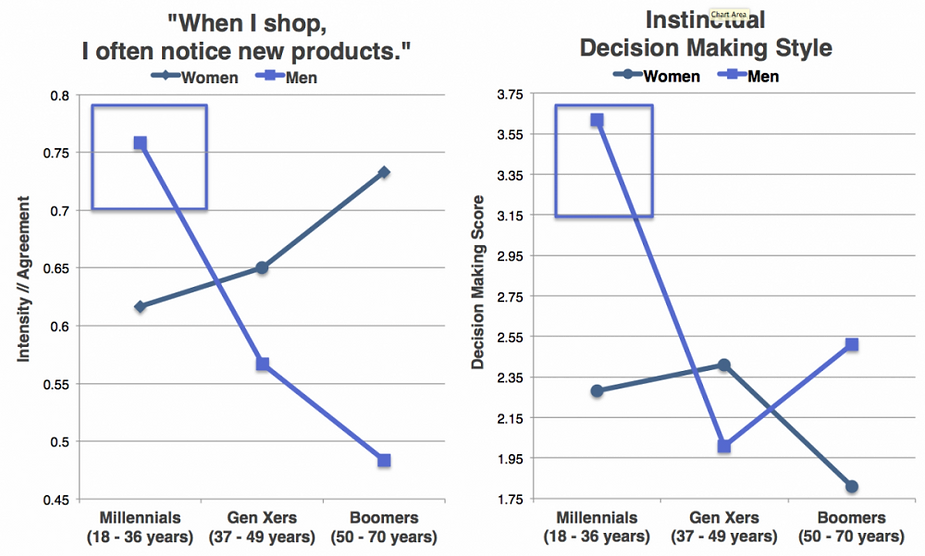
More so than GenXers or Boomers, Millennial men gravitate toward visual and perceptual information on packaging while shopping.
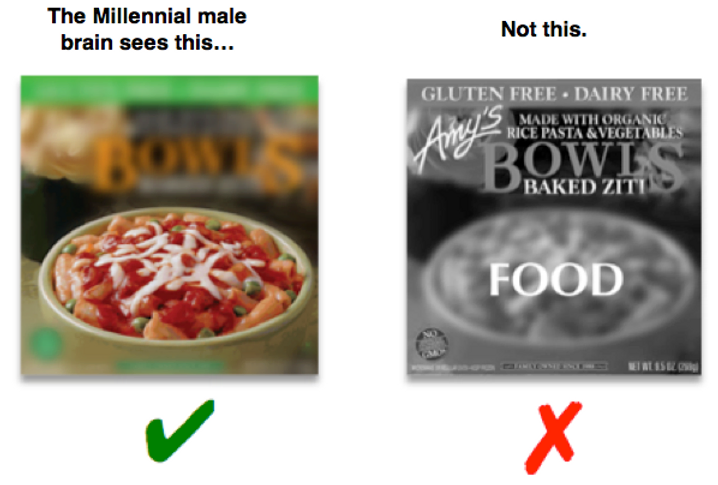
They strongly rely on pictures / design of packaging, as opposed to package labeling, to find what they’re looking for.
Understanding Millennial men’s Habit of Control means we can employ specific strategies to reach them:
Convey the sense of exclusive knowledge, access, or capability.
Focus on package visuals and aesthetic. Minimize the noise.
Capitalize on phrases and visuals connoting high quality or class such as “better,’ ‘best,’ and #1. Because Millennial men are compelled less by rational price sensitivity, phrases like ‘value’ and ‘budget friendly’ resonate much less.
Millennial women require a much different approach: Tailor your message to the Millennial woman’s ‘Knowledge Seeker’ mind.
Evolutionary psychology tells us that women typically rely on ‘Diver’ (control via deep personal connection), and this is true for GenX and Boomer women. Millennial women, however, tell a different story…
Millennial women express ‘Expert’ (control via individual skill and knowledge) more than each of the other generations, and much more than Millennial men.
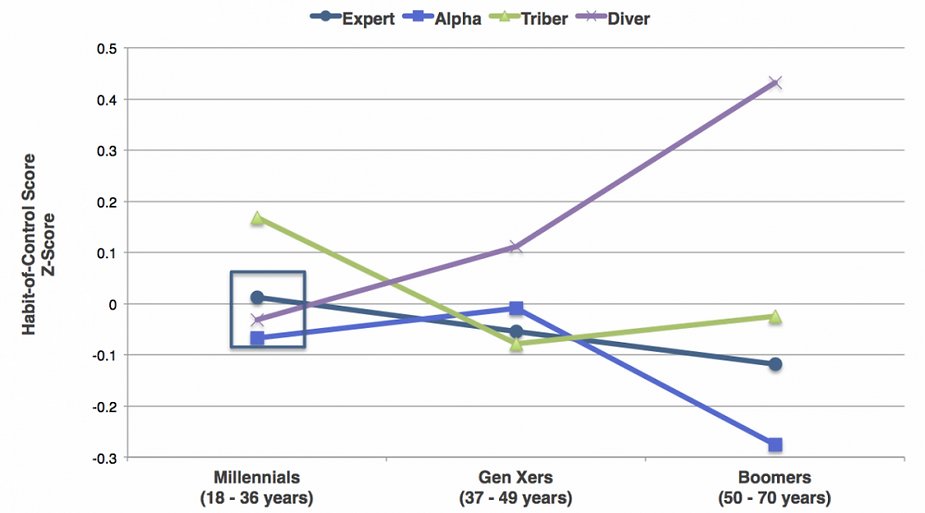
Previous generations expressed Diver strongly over the other Habits of Control, but modern day survival pressures drive millennial women to express Expert over Diver.
Knowing that Millennial women are ‘knowledge seeker’ consumers tells us 3 things:
Millennial women work to amass knowledge to feel fully informed.
They weigh logistical information and rational, not emotional, appeals when making decisions.
They are mission-oriented and know what to buy before going to the store
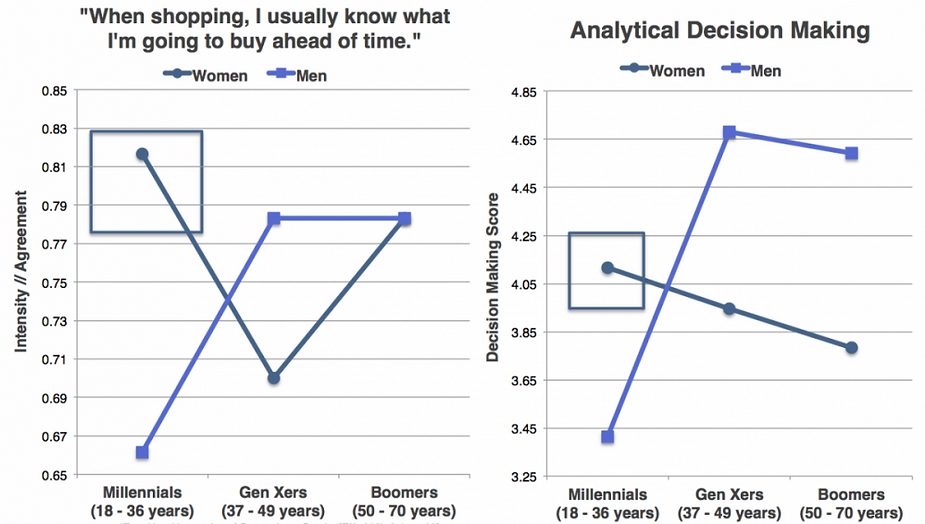
Millennial women demonstrate their ‘Expert’ attention while shopping by relying on verbal and logistical information and package labeling as opposed to pictures and package design.
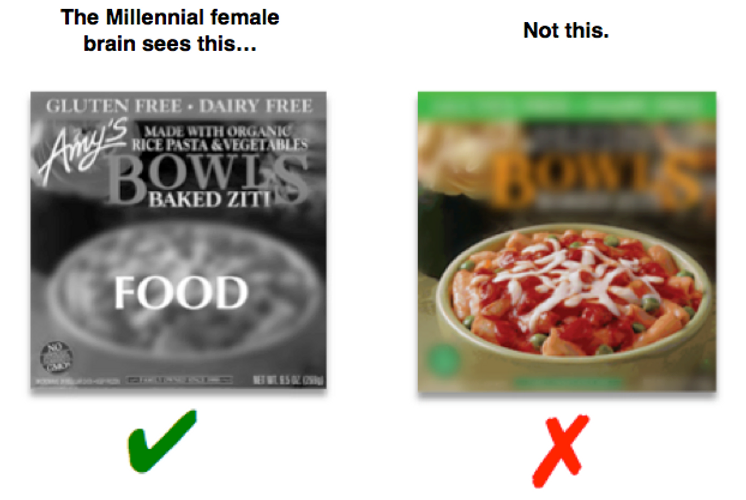
Millennial women want to feel confident in their informed decisions, so follow these guidelines in order to win with this ‘Knowledge Seeker’ consumer:
Focus on verbal, detailed packaging. List product attributes.
Avoid appeals to the heart unless the rationality of how it will be accomplished is explained.
Online, provide resources of logistical product benefits, to capture their attention during research before the shop.
Skate where the puck is going to position your business
As context shifts, we see Millennial’s Habits of Control evolve.
As millennial men move from their 20’s into their mid-thirties, their Triber & Expert Habits of Control strengthen. They evolve toward verbal processing, rational decision-making, and a mission-oriented shopper style. Messaging to these individuals should transition to more logical and informational appeals:
Millennial women’s shift will occur sooner in their lives. As they move into their late 20’s, their Diver Habit of Control will strengthen and they will begin to behave more like older generations of women. They evolve toward perceptual processing, sensorial decision-making, and a discovery shopping style.
Why does this behavioral science research matter for brands? Understanding WHY a consumer behaves a certain way is what enables brands to predict and influence behavior in the marketplace. And treating Millennials differently – from other generations and from each other—can enable marketing, product innovation, and new product development that drives results that matter.





